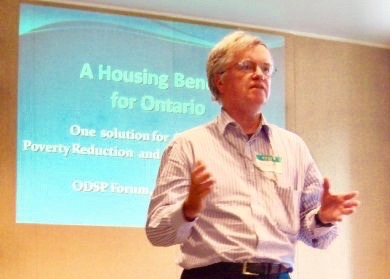John: I started washing walls in an old age home in 1968, so I’m entering my fiftieth year of working in the poverty reduction space. The short answer to your question is yes, Canada’s poor are better off, but it’s complicated. Governments, working separately and together, have created a system that has brought people out of the deep poverty that they were in decades ago, but many still remain in what I would call shallow poverty. I don’t think since the 1960s that we as Canadians have taken a comprehensive approach, one in which we look at the whole of our poverty reduction and income security systems. In Canada, generally speaking, we have been very good at attacking one problem at a time.
In the latter part of the ‘60s and into the ‘70s, we started to look at poverty amongst people over the age of sixty-five. We put in a system that could be called a guaranteed annual income for people over sixty-five. It doesn’t actually get all people over the poverty line but through various programs that we’ve bought in, the Canada Pension Plan, the Old Age Security Plan, the Guaranteed Income Supplement, the GAINS Program, and various tax credits, when you put them all together, we have taken most seniors out of poverty. In some places, around ten per cent remain in shallow poverty. For example, a single senior who has lived here their whole life with no other income and no CPP receives an income of just over $20,000: that is just under the poverty line of $22,000.
At the end of the 1990s, we moved our focus to child poverty. Through different mechanisms such the federal Canada Child Benefit, and provincial programs like the Ontario Child Benefit, we were able to bring an awful lot of children out of poverty.
Our present efforts are with the working poor. Next year, in Ontario, a full-time minimum wage job will result in an annual wage of around $29,000, which is approximately $7,000 higher than the present poverty line. And that’s really quite extraordinary. At the same time, the federal government has announced its signature changes to a new program called the Canada Workers Benefit that started out as the Working Income Tax Benefit. This program targets the working poor – you have to be a low-income worker to get it. Over the next two years, the federal government is going to be putting another $700 million into that program.
Of course, there have been various attempts to improve our income security system for people with disabilities and for people who rely on social assistance, but they haven’t done nearly as well as seniors, children, and the working poor.




